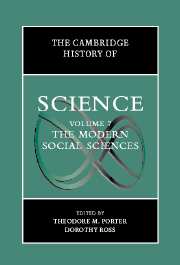Book contents
- Frontmatter
- 1 Introduction: Writing the History of Social Science
- PART I SCIENCES OF THE SOCIAL TO THE LATE NINETEENTH CENTURY
- 2 Genres and Objects of Social Inquiry, From the Enlightenment to 1890
- 3 Social Thought and Natural Science
- 4 Cause, Teleology, and Method
- 5 Utopian Socialism And Social Science
- 6 Social Surveys in the Eighteenth and Nineteenth Centuries
- 7 Scientific Ethnography and Travel, 1750–1850
- 8 History and Historicism
- 9 Bringing the Psyche into Scientific Focus
- 10 Continental Political Economy From the Physiocrats to the Marginal Revolution
- 11 British Economic Theory From Locke To Marshall
- 12 Marx and Marxism
- PART II THE DISCIPLINES IN WESTERN EUROPE AND NORTH AMERICA SINCE ABOUT 1880
- PART III THE INTERNATIONALIZATION OF THE SOCIAL SCIENCES
- PART IV SOCIAL SCIENCE AS DISCOURSE AND PRACTICE IN PUBLIC AND PRIVATE LIFE
- Index
- References
11 - British Economic Theory From Locke To Marshall
from PART I - SCIENCES OF THE SOCIAL TO THE LATE NINETEENTH CENTURY
Published online by Cambridge University Press: 28 March 2008
- Frontmatter
- 1 Introduction: Writing the History of Social Science
- PART I SCIENCES OF THE SOCIAL TO THE LATE NINETEENTH CENTURY
- 2 Genres and Objects of Social Inquiry, From the Enlightenment to 1890
- 3 Social Thought and Natural Science
- 4 Cause, Teleology, and Method
- 5 Utopian Socialism And Social Science
- 6 Social Surveys in the Eighteenth and Nineteenth Centuries
- 7 Scientific Ethnography and Travel, 1750–1850
- 8 History and Historicism
- 9 Bringing the Psyche into Scientific Focus
- 10 Continental Political Economy From the Physiocrats to the Marginal Revolution
- 11 British Economic Theory From Locke To Marshall
- 12 Marx and Marxism
- PART II THE DISCIPLINES IN WESTERN EUROPE AND NORTH AMERICA SINCE ABOUT 1880
- PART III THE INTERNATIONALIZATION OF THE SOCIAL SCIENCES
- PART IV SOCIAL SCIENCE AS DISCOURSE AND PRACTICE IN PUBLIC AND PRIVATE LIFE
- Index
- References
Summary
The mercantilist pamphlets of the 1600s are commonly viewed as the first systematic writings on political economy, at least in the English language. While many of these works were unabashed promotions of merchant rights, historians have come to appreciate their rich array of insights on the topics of money, market forces, and the global economy. Two other important traditions of economic inquiry had emerged by the late seventeenth century, fostered by the rise of political freedom and the growth of a scientific culture. The first stems from John Locke’s Two Treatises of Government (1689–90), which addressed the problems of economic justice and distribution via the fundamental concepts of rights and property. Locke also privileged the economic contract in his state of nature and adumbrated a labor theory of value. The second tradition, exemplified by William Petty’s Political Arithmetic (1690), devised quantitative measures of economic phenomena, such as the national product of Ireland, the velocity and quantity of money, and the population of London. While Petty’s measures were bold and imprecise, they helped draw attention to aggregate phenomena and thus to new empirical relationships.
All three lines of thought spoke to the new capitalist system, which had transformed early modern Europe. As Joseph Schumpeter has rightly observed: “By the end of the fifteenth century most of the phenomena that we are in the habit of associating with that vague word Capitalism had put in their appearance,… [and] even then these phenomena were not all of them new.” He had in mind the prices of commodities and factors of production, such as the interest rate.
- Type
- Chapter
- Information
- The Cambridge History of Science , pp. 171 - 182Publisher: Cambridge University PressPrint publication year: 2003
References
- 1
- Cited by

